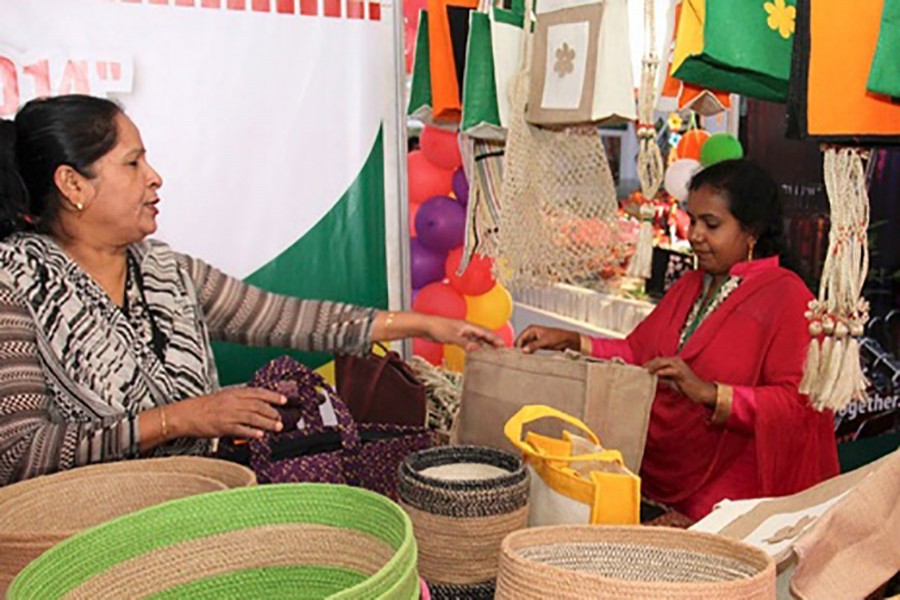Efficient credit guarantee scheme can help accelerate the growth of small and medium enterprises (SMEs), bankers and experts said on Thursday.
The concept, which has been practiced in over 100 countries across the world, will contribute to removing the drawback involving collateral through sharing the risk of the lender.
Despite having substantial potential, the contribution of the SME sector to the GDP (gross domestic product) in Bangladesh is only 25 per cent, compared with that of 60 per cent, over 50 per cent, 40 per cent and 30 per cent in China, Sri Lanka, India and Pakistan respectively, they said.
The views came at a roundtable discussion, organised by Bangladesh Institute of Bank Management (BIBM).
Deputy governor of Bangladesh Bank (BB) SM Muniruzzaman was present as the chief guest.
BIBM assistant professor Dr. Md. Mosharref Hossain presented a paper on the credit guarantee scheme for promoting access to finance for SMEs.
He said the guarantee scheme is a mechanism in which an independent third-party called the guarantor provides guarantee to repay part or the entire loan amount to the lender in case of borrower's default.
In case of borrower's default, the lender recovers the value of the guarantee. In essence, the scheme absorbs an important share of borrower's risk and compensate for insufficient collateral, the BIBM associate professor said.
"Guarantees are usually offered against fees provided either by the borrower or the lender or both. In case of default, the lender is normally obliged to proceed with the collection of the loan and share proceeds with the guarantor," he said.
He also proposed a draft model of the scheme under the government administration with a 50:50 ratio of risk-sharing in the discussion.
BB deputy governor SM Muniruzzaman said most of the financial institutions show less interest in offering credit to SMEs due to the perceived greater risk and lack of sufficient collaterals.
On the other hand success of SMEs is largely dependent on the availability of finance.
For that reason, finding alternative approach to making available funds for SMEs by minimising risk for the lender is an additional challenge, he said.
"In this respect, we may consider guarantee scheme a suitable alternative," said Mr. Muniruzzaman, also chairman of BIBM executive committee.
Mentioning various programmes of the BB for promoting SME finance, he said the BB in collaboration with the United Nations Capital Development Fund initiated the guarantee amounting to US$ 0.2 million for women entrepreneurs for a period from October 2016 through June, 2019.
"Under the scheme, a total of 12 guarantees have been issued against Tk 11.1 million in 12 different clusters of eight districts in Bangladesh," he said.
Terming the selection of borrowers a key factor behind the success of SMEs, BIBM supernumerary professor Helal Ahmed Chowdhury said the financial institutions should select people having no collateral but enough expertise and skill.
"The pricing should be competitive. If you (FIs) only consider this an option for earning the objectives of such scheme will not be achieved," he added.
He laid emphasis on regular and close monitoring by the FIs to ensure the proper use of the fund.
BIBM supernumerary professor Yasin Ali said the country has huge potentials, which needs to be tapped fully to achieve the inclusive economic growth and SMEs' contribution is vital in this respect.
He suggested not imposing too many charges that might discourage the entrepreneurs from taking the loan.
"When the risk of default keeps going, FIs become reluctant to finance and that is the case happening here. So, you have to be sincere and cautious about selecting borrowers," he added.
Moderating the function, economist Professor Barkat-e-Khuda said the country's steady economic growth was driven by four major factors-SMEs, readymade garment (RMG), remittances and agriculture sector.
"SME deserve considerable attention from the policymakers that include the government, BB, commercial banks and SME Foundation to ensure access to formal sector finance for the sector," he said.
Senior officials of various commercial banks and non-bank financial institutions (NBFIs) participated in the roundtable.


